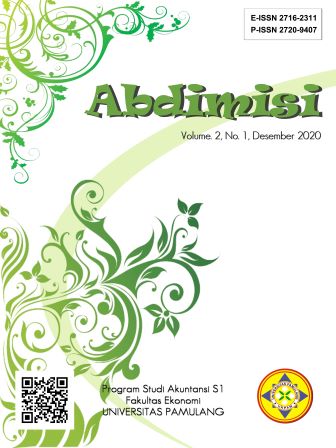Membangun Chemistry Gen Z dan Pajak
Abstract
Pajak merupakan sumber penerimaan terbesar bagi negara Indonesia. Pajak juga memiliki peranan yang penting dalam pembangunan dan pemulihan ekonomi. Akan tetapi, tingkat kesadaran dan kepatuhan wajib pajak di Indonesia masih sangat rendah. Hal ini disebabkan oleh kurangnya pengetahuan mengenai perpajakan. Karena itulah kami memutuskan untuk melakukan sosialisasi dengan tujuan agar dapat meningkatkan pemahaman para siswa/siswi mengenai pentingnya kesadaran dan kepatuhan pajak sejak dini. Khalayak sasaran dari kegiatan ini adalah para pelajar Pondok Pendawa Kemang, Bogor. Teknik pengumpulan data yang digunakan adalah teknik kuesioner (angket), metode dokumentasi dan metode deskriptif dalam analisis data. Metode pelaksanaan yang digunakan adalah dengan metode penyuluhan berupa seminar yang dilakukan secara tatap muka dan test berupa soal yang bervariasi mengenai perpajakan. Hasil yang diharapkan dari sosialisasi ini adalah target dapat memahami dan sadar akan pentingnya pajak.
Kata Kunci: Pajak, Generasi Z, Kesadaran
Abstract
Building Chemistry Gen Z and Taxes. Taxes are the largest source of revenue for the Indonesian state. Taxes also have an important role in economic development and recovery. However, the level of awareness and compliance of taxpayers in Indonesia is still very low. This is caused by a lack of knowledge about taxation. That's why we decided to carry out outreach with the aim of increasing students' understanding of the importance of tax awareness and compliance from an early age. The target audience for this activity is the students of Pondok Pendawa Kemang, Bogor. The data collection techniques used are questionnaire techniques, documentation methods and descriptive methods in data analysis. The implementation method used is the counselling method in the form of face-to-face seminars and tests in the form of various questions regarding taxation. The expected result of this socialization is that the target can understand and be aware of the importance of taxes.
Keywords: Tax;Generation Z ;Consciousness
References
Farida, A., & Irawati, W. (2023). Pengaruh Sanksi Perpajakan Dan Keadilan Pajak Terhadap Kepatuhan Wajib Pajak Umkm Dengan Dimediasi Kualitas Pelayanan: Studi Pada Wajib Pajak Usaha Mikro Kecil dan Menengah yang Terdaftar di KPP Kebayoran Lama. Jurnal Revenue: Jurnal Ilmiah Akuntansi, 3(2), 488-505.
Hardiningsih, P., & Yulianawati, N. (2011). Faktor-faktor yang mempengaruhi kemauan membayar pajak. Dinamika keuangan dan Perbankan, 3(1), 126-142.
Nurnaafiyanti, D. (2015). PENGARUH PENERIMAAN PAJAK REKLAME TERHADAP PENDAPATAN ASLI DAERAH (PAD) KOTA CIMAHI (Studi Kasus pada Dinas Pendapatan Daerah Kota Cimahi) (Doctoral dissertation, Universitas Widyatama).
Sari, R. H. D. P., & Mashuri, A. A. S. (2022). Tax Morale: Kesadaran Pajak Generasi Muda Sebagai Wujud Bela Negara. Syntax Literate; Jurnal Ilmiah Indonesia, 7(5), 6124-6137.
Sari, E. W., Trisnasari, W. D., & Febriani, A. N. (2023). Membangun Budaya Sadar Pajak Pada Generasi Z. Madaniya, 4(1), 304-310.
Suharsono, A., & Galvani, S. (2020). Optimalisasi Edukasi Perpajakan bagi Generasi Milenial Melalui Video. Scientax, 2(1), 123-139.
Undang-Undang Republik Indonesia Nomor 28 Tahun 2007 Tentang Perubahan Ketiga atas Undang-Undang Nomor 6 Tahun 1983 Tentang Ketentuan Umum dan Tata Cara perpajakan.
Valianti, R. M., Lilianti, E., Saladin, H., & Darwin, J. (2021). Sadar pajak sejak dini dalam pendidikan. Jurnal PkM (Pengabdian Kepada Masyarakat), 4(2), 130-137..
Downloads
Published
Issue
Section
License
Copyright (c) 2024 Wahyu Nurul, Aris Sanulika

This work is licensed under a Creative Commons Attribution-ShareAlike 4.0 International License.
Copyright Notice
Authors who publish with this journal agree to the following terms:
- Authors retain copyright and grant the journal right of first publication with the work simultaneously licensed under a Creative Commons Attribution License that allows others to share the work with an acknowledgement of the work's authorship and initial publication in this journal.
- Authors are able to enter into separate, additional contractual arrangements for the non-exclusive distribution of the journal's published version of the work (e.g., post it to an institutional repository or publish it in a book), with an acknowledgement of its initial publication in this journal.
- Authors are permitted and encouraged to post their work online (e.g., in institutional repositories or on their website) prior to and during the submission process, as it can lead to productive exchanges, as well as earlier and greater citation of published work (See The Effect of Open Access).
Abdimisi have CC-BY-SA or an equivalent license as the optimal license for the publication, distribution, use, and reuse of scholarly work.
In developing strategy and setting priorities, Abdimisi recognize that free access is better than priced access, libre access is better than free access, and libre under CC-BY-SA or the equivalent is better than libre under more restrictive open licenses. We should achieve what we can when we can. We should not delay achieving free in order to achieve libre, and we should not stop with free when we can achieve libre.
You are free to:
- Share — copy and redistribute the material in any medium or format
- Adapt — remix, transform, and build upon the material for any purpose, even commercially.
- The licensor cannot revoke these freedoms as long as you follow the license terms.

